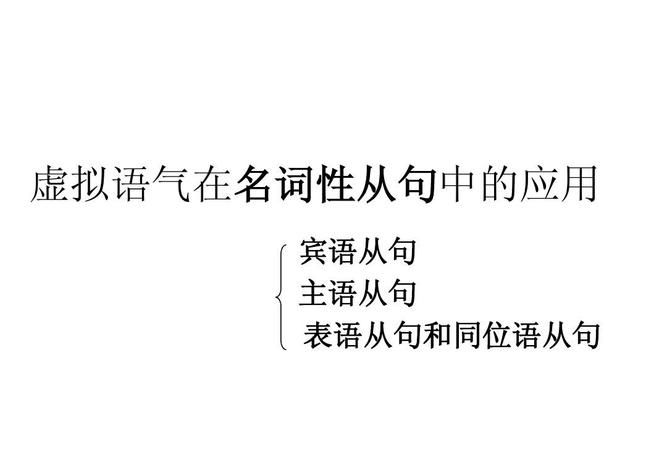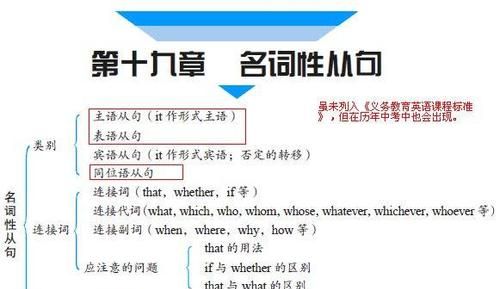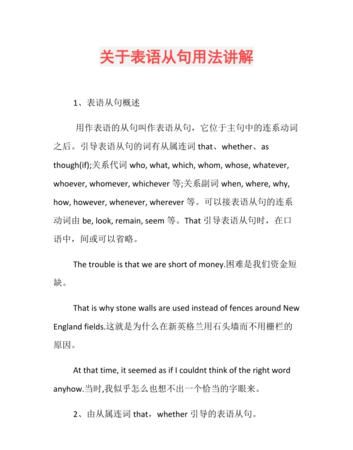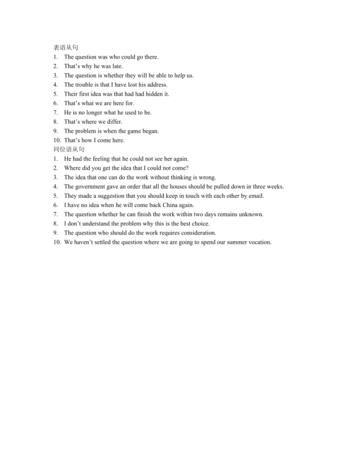本文目录
表语从句because的用法
导语: 表语从句在一个 复合句中,从句作的是主句的表语成分。下面我为您收集整理了英语表语从句的用法,希望对您有帮助!
表语从句的定义:
A. 表语从句就是用一个句子作为表语。说明主语是什么或者怎么样,由名词、形容词或相当于名词或形容词的词或短语充当,和连系动词一起构成谓语。
例句:The problem is when we can get a pay rise. 问题是,当我们可以得到加薪。
B. 连接表语从句的连接词有:that, what, who, when, where, which, why。例句:
He has become what he wanted to be ten years ago.
他已经成为了他10年前想成为的。
She has remained where I stood yesterday for an hour.
她一直在我昨天站的地方站了一个小时。
His suggestion is that we should stay calm.
他的建议是,我们应该保持冷静。
The question is when he can arrive at the hotel.
问题是,他什么时候可以到达酒店。
表语从句的.注意事项:
A. 表语从句一定要用陈述语序。
False: The question is when can he arrive at the hotel.
Right: The question is when he can arrive at the hotel.
B. 不可以用if,而用whether连接表语从句(as if 例外);
引导宾语从句时可以互换if/whether,位于介词后要用whether;
位于句首时要用whether;
引导表语从句,主语从句,同位语从句时要用whether。
False: The question is if the enemy is marching towards us.
Right: The question is whether the enemy is marching towards us.
Right: It looked as if he had understood this question.
C. 不像宾语从句,在有表语从句的复合句中,主句时态和从句时态可以不一致。
Right: The question is who will travel with me to Beijing tomorrow.
Right: The question is why he cried yesterday.
D. that在表语从句中不可以省掉。
表语从句的基本用法:
表语从句只能置于主句之后,而主句的动词只能是联系动词。
名词性从句在be等系动词后作表语时被称为表语从句,例如:
The problem is how we can get the things we need. 问题是我们怎样能弄到我们需要的东西。(how 在表语从句中充当方式状语)
The scissors are not what I need. 这把剪刀不是我所需要的。(what在表语从句中充当宾语)
What I told him was that I would find him a good play. 我告诉他的是我会给他找个好剧本。(what在主语从句中作直接宾语,that作为表语从句的引导词在该表语从句中不充当句子成分,不能省略)
That is what I want to tell you. 那就是我想要对你讲的。(what在表语从句中充当直接宾语)
That is why she failed to pass the exam. 那就是她考试不及格的原因。(why在表语从句中充当原因状语)
注意:“That is why...”是常用句型,意为“这就是……的原因/因此……”,其中why引导的名词性从句在句中作表语,该句型通常用于针对前面已经说明过的原因进行总结,又如:That is why you see this old woman before you know, Jeanne. 珍妮,这就是现在这个老太婆出现在你面前的原因。(前文提到Jeanne对老妇人显得苍老憔悴深感诧异,说话人对她讲述了其中的原因之后,用这一句来进行概括)。
下面是两个与“That is why...”形式相似的结构,它们与“That is why...”结构之间的关系要能够辨析清楚:
(1)“That is why...”与“That is the reason why...”同义,只不过从语法结构上讲,“That is the reason why...”中why引导的是—个定语从句,将其中的the reason去掉则与“That is why...”结构一样,例如:
That is (the reason) why I cannot agree. 这就是我不能同意的理由。
(2)“That is because...”句型中从属连词because引导的名词性从句在此作表语,这也是个常用句型,意为“这就是为什么……/因为……”。“That is because...”与“That is why...”之间的不同在于“That is because...”指原因或理由,“That is why...”则指由于各种原因所造成的后果, 例如:
He did not see the film last night. That is because he had to help his little sister with her homework. 昨天晚上他没有去看电影,那是因为他得帮助他的妹妹做作业。(第一句话说明结果, 第二句话说明原因)
He had seen the film before. That is why he did not see it last night. 他以前曾看过那部电影,因此他昨天晚上没有去看。(第一句话说明原因,第二句话说明结果)

表语从句造句子
问题是谁去做这项危险的工作
The problem is who is to do the dangerous work
我想知道的是我们支持谁
I want to know is who we support
这就是我们的根本利益所在
This is what we should do
那是我们应该做的
And that is what we should do
你不知道的是谁的汽车被偷了
You don't know who's car was stolen
这就是这个城市那时所处的位置
This is the city that position
中国人就是这样开始种庄稼的
This is the Chinese people began to grow crops.
我的建议是下午开个会
My advice is to have a meeting this afternoon
问题是他是否愿意嫁给你
The question is whether he is willing to marry you
他迟到了,但那是因为他母亲病了
He was late, but that is because his mother was ill

宾语从句例句复杂句
一、十句宾语从句例句:
I think you are great.我认为你很棒。
I think it necessary that we take plenty of hot water every day .我认为每天多喝开水是有必要的。
I guess he is Jack.我猜他是杰克。
I know there is a supermarket near here.我知道附近有超市。
I wonder if there is a WC near here.我想知道附近有没有厕所
I don’t know if there will be a bus any more.我不知道还会不会有公家车。
I don’t know whom you should depend on.我不知道你该依靠谁。
The book will show you what the best CEOs know.这本书会告诉你最好的执行总裁该了解些什么。
Could you please tell me how you read the new panel?你能展示给我怎么用这个新的操作盘吗?
Do you know who has won this game?你知道谁赢了这一局游戏吗?
二、十个定语从句例句:
He is the man who gave me money. 他是给我钱的那个人。
They rushed over to help the man whose car had broken down.那人车坏了,大家都跑过去忙。
Beijing is the place whereI was born.北京是我的出生地。
Is this the reason why (for which) he refused our offer? 这就是他拒绝我们帮助他的理由吗?
His father died the year (that / when / in which) he was born.他父亲在他出生那年逝世了。
This is the mountain village (which) I visited last year.这是我去年去过的山村。
Is he the man who/that wants to see you?他就是想见你的人吗?
Please pass me the book whose (of which) cover is green. 请递给我那本绿皮的书。
I’d like a room whose window looks out over the sea.我想要一间开窗可见海的房间。
Have you got the postcard(which) I sent you?你收到我寄给你的明信片了吗?
扩展资料:
复合句(Compound Sentence)分为并列复合句和主从或从属复合句,并列复合句是有并列连词:
and、or、but连接;从属复合句由一个主句(Principal Clause)和一个或一个以上的从句
(Subordinate Clause)构成。用疑问词作引导词,主句是全句的主体,通常可以独立存在;从句则是
一个句子成分,不能独立存在。从句不能单独成句,但它也有主语部分和谓语部分,就像一个句子一
样。所不同在于,从句须由一个关联词(conjunction)引导。 根据引导从句功能不同,大致可分
为:主语从句、表语从句、宾语从句、定语从句、状语从句等。

英语主谓宾结构例句讲解
英语句型结构
一.简单句:
英语基本句型-1
主系表结构:本结构是由主语+系动词+表语组成,主要用以说明主语的特征,类属,状态,身份等.
系动词有:
1.表示特征和存在状态的 be, seem, feel, appear, look, *** ell, taste, sound;
2.表示状态延续的 remain, stay, keep, continue, stand;
3.表示状态变化的bee, get, turn, go, run, fall, e, grow;
eg: Our English teacher is thirty years old.
The cake tastes delicious.
The potatoes went bad in the fields.
Deep water stays still.
He was at work.
She is in good health.
It is beyond my ability.
I was at a loss.
You are under arrest.
英语基本句型-2
主谓结构:本结构是由主语加不及物的谓语动词构成, 常用来表示主语的动作.
如:The sun rises.
Tom has already left.
主语可有修饰语-定语,谓语可有修饰语-状语.
如: 1. The red sun rises in the east.
2. They had to travel by air or boat.
3. She sat there alone.
4. He came back when we were eating.
5. Weak buildings will fall down in an earthquake.
英语基本句型-3
主谓宾结构:本结构是由主语+及物的谓语动词+宾语构成.宾语成分的多样化使得这一结构异常复杂.
如:1. Tom made a hole in the wall.
2. I don’t know if he can e tomorrow.
3. They haven’t decided where to go next.
4. She stopped teaching English two years ago.
英语基本句型-4
双宾语结构:此结构由“主语+及物谓语动词+间接宾语(人)+直接宾语(事物)”组成.如: He brings me COOKIEs every day.
但若要先说出直接宾语(事物),后说间接宾语(人),则要借助于介词to或for.如: He brings COOKIEs to me every day.
She made a beautiful dress for me.
用to侧重指动作的方向,表示朝着,向着,对着某人.
用for 侧重指动作的受益者,表示为了某人,替某人.
常跟双宾语的动词有:(需借助to的)bring, give, lend, hand, offer, pass, pay, promise, return, send, show, teach, tell, write, ask等;
(需借助for 的) buy, call, cook, choose, draw, find, get, make, order, sing, save, spare等.
英语基本句型-5
复合宾语结构: 此结构由“主语+及物的谓语动词+宾语+宾语补足语”构成.宾语补足语用来补充和说明宾语的性质和特点,若无宾语补足语,则句意不够完整.可以用做宾补的有:名词,形容词,副词,介词短语,动词不定式,分词等.
如: The sun keeps us warm.
I heard him singing.
They made Tom monitor.
He used to do his homework with his radio on.
My mother asked me to clean my room.
The teacher made all students finish their homework on time.
用 it 做形式宾语,而将真正的宾语放到宾语补足语的后面,以使句子结构平衡,是英语常用的句型结构方式.即:主语+谓语+it+宾补+真正宾语.如:
I found it very pleasant to be with your family.
也可以说 I found it was pleasant to be with your family. 它们的区别在于第一个是简单句第二个是复合句,意思都是一样的.
英语基本句型-6
There be 句型: 此句型是由“there+be+主语+状语”构成,用以表达存在关系可以称“……有……”. 它其实是全倒装的一种情况,主语位于谓语动词 be 之后,there 仅为引导词,并无实际语意.此句型有时不用be动词,而用 live, stand, e, go, lie, remain, exist, arrive等,但一般不用have.如:
There stands a hill in the middle of the park.
Once upon a time there lived an old king in the town.
Be 与其后的主语在人称和数量上一致,有时态和情态变化.如:
现在有 there is/are …
过去有 there was/were…
将来有 there will be…;there is /are going to be...
现在已经有 there has/have been…
可能有 there might be...
肯定有 there must be …/there must have been...
过去曾经有 there used to be …
似乎有 there seems/seem/seemed to be …
碰巧有 there happen/happens/happened to be …
Once, there lived an old fisherman in a village by the sea.
The weatherman says there’ll be a strong wind in the afternoon.
There used to be a cinema here before the war.
二.并列句.
结构:
1.由分号连接.
eg. Some people cry; others laugh.
Let’s start early; we have a long way to go.
2.由并列连词及词组连接-——and/ but /or/ so / however / still/ therefore /yet /while /otherwise /for /both…and…/not only…but also…/as well as/
or else/ either…or…/neither…nor…/not…but…等.
eg: I’d like to, but I have lots of homework to do.
I’ve got a cold, so I’m going to bed.
Both my father and mother are teachers.
It’s very good, yet I don’t like it.
三、复合句
构成:由一个逐句和一个或一个以上的从句构成.主句和从句都有完整的主谓结构,但主句是全局的主体,从句只是全句中的一个成分,不能独立存在.从句通常是用引导词来引导的,引导词起连接主句和从句的作用.
分类:名词性从句(主语从句、表语从句、宾语从句和同位语从句),形容词性从
句(定语从句),副词性从句(状语从句). 主----谓---宾
名/代--动词--名/代
we-- saw --you.
we-- did --the work.
主-----系-----表
名/代--系动词---形容次/名词/代词
you are beautiful
you seems worried.
you are a stufent.
相同点都三部分,主语也一样.
不同动词和系动词,时态一样,否定式不同.动词加助动词,系动词不用.
表语可以是形容词,宾语不行. 主 谓 宾I would almost rather see you dead,I是主语 see是谓语 you是宾语 dead是宾语补足语主 谓She did not tremble before her father’s anger.She是主语 did not tremble是谓语 before her father’s anger是状语主 系 表 That was how Mary Cassatt, born 1844, began her struggle as an artist. That是主语 was是系动词 how Mary Cassatt, born 1844, began her struggle as an artist是表语从句

以上就是关于表语从句例句0句,表语从句because的用法的全部内容,以及表语从句例句10句 的相关内容,希望能够帮到您。
